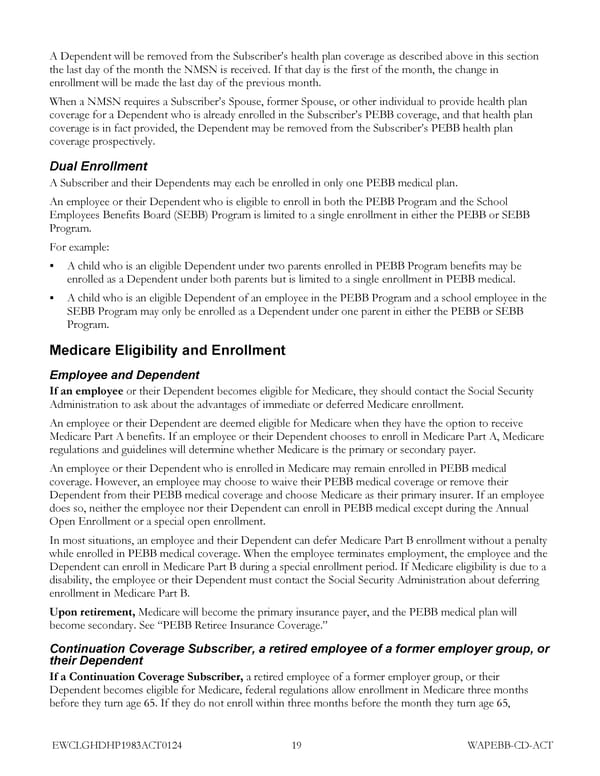A Dependent will be removed from the Subscriber’s health plan coverage as described above in this section the last day of the month the NMSN is received. If that day is the first of the month, the change in enrollment will be made the last day of the previous month. When a NMSN requires a Subscriber’s Spouse, former Spouse, or other individual to provide health plan coverage for a Dependent who is already enrolled in the Subscriber’s PEBB coverage, and that health plan coverage is in fact provided, the Dependent may be removed from the Subscriber’s PEBB health plan coverage prospectively. Dual Enrollment A Subscriber and their Dependents may each be enrolled in only one PEBB medical plan. An employee or their Dependent who is eligible to enroll in both the PEBB Program and the School Employees Benefits Board (SEBB) Program is limited to a single enrollment in either the PEBB or SEBB Program. For example: A child who is an eligible Dependent under two parents enrolled in PEBB Program benefits may be enrolled as a Dependent under both parents but is limited to a single enrollment in PEBB medical. A child who is an eligible Dependent of an employee in the PEBB Program and a school employee in the SEBB Program may only be enrolled as a Dependent under one parent in either the PEBB or SEBB Program. Medicare Eligibility and Enrollment Employee and Dependent If an employee or their Dependent becomes eligible for Medicare, they should contact the Social Security Administration to ask about the advantages of immediate or deferred Medicare enrollment. An employee or their Dependent are deemed eligible for Medicare when they have the option to receive Medicare Part A benefits. If an employee or their Dependent chooses to enroll in Medicare Part A, Medicare regulations and guidelines will determine whether Medicare is the primary or secondary payer. An employee or their Dependent who is enrolled in Medicare may remain enrolled in PEBB medical coverage. However, an employee may choose to waive their PEBB medical coverage or remove their Dependent from their PEBB medical coverage and choose Medicare as their primary insurer. If an employee does so, neither the employee nor their Dependent can enroll in PEBB medical except during the Annual Open Enrollment or a special open enrollment. In most situations, an employee and their Dependent can defer Medicare Part B enrollment without a penalty while enrolled in PEBB medical coverage. When the employee terminates employment, the employee and the Dependent can enroll in Medicare Part B during a special enrollment period. If Medicare eligibility is due to a disability, the employee or their Dependent must contact the Social Security Administration about deferring enrollment in Medicare Part B. Upon retirement, Medicare will become the primary insurance payer, and the PEBB medical plan will become secondary. See “PEBB Retiree Insurance Coverage.” Continuation Coverage Subscriber, a retired employee of a former employer group, or their Dependent If a Continuation Coverage Subscriber, a retired employee of a former employer group, or their Dependent becomes eligible for Medicare, federal regulations allow enrollment in Medicare three months before they turn age 65. If they do not enroll within three months before the month they turn age 65, EWCLGHDHP1983ACT0124 19 WAPEBB-CD-ACT
 Kaiser Permanente NW CDHP EOC (2024) Page 25 Page 27
Kaiser Permanente NW CDHP EOC (2024) Page 25 Page 27